| Srl | Item |
| 1 |
ID:
120264
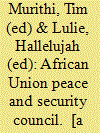

|
|
|
|
|
| Publication |
Pretoria, Institute for Securities Studies, 2012.
|
| Description |
xviii,268p.pbk
|
| Standard Number |
9781920422776
|
|
|
|
|
|
|
|
|
|
|
|
Copies: C:1/I:0,R:0,Q:0
Circulation
| Accession# | Call# | Current Location | Status | Policy | Location |
| 057289 | 341.249/MUR 057289 | Main | On Shelf | General | |
|
|
|
|
| 2 |
ID:
087309
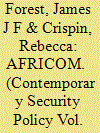

|
|
|
|
|
| Publication |
2009.
|
| Summary/Abstract |
Officially activated on 1 October 2008, US Africa Command (AFRICOM) is first and foremost an internal consolidation and reorganization of Defense Department personnel. Its primary mission is to help Africans address their security challenges. AFRICOMdiffers from other Defense Department organizations by focusing primarily on activities that contribute not to warfighting, but war prevention. Even so, it has struggled with controversy since its inception. The views of key constituencies range from lukewarm acceptance to outright hostility. The central lesson from this research is that the views of foreign audiences toward American foreign policies have a direct impact on the success of those policies. One of its most difficult tasks will be convincing key audiences - African governments and militaries, NGOs, international media, and not least other US government agencies and the Congress - that the effort and funding put into this command were worthwhile and should continue. Confusion still remains over exactly what AFRICOM is and what it wants to do. Sorting this out will require consulting, listening, and learning. Its leaders must develop and lead a new type of organization that runs counter to traditional instincts of senior personnel in the Department of Defense who continue to resist the notion of interagency coordination. In sum, we remain hopeful that the past need not predict the future of American policies in Africa.
|
|
|
|
|
|
|
|
|
|
|
|
|
|
|
|
| 3 |
ID:
087320
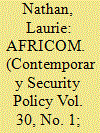

|
|
|
| 4 |
ID:
087322
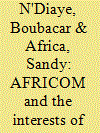

|
|
|
| 5 |
ID:
104597


|
|
|
| 6 |
ID:
087661


|
|
|
|
|
| Publication |
2009.
|
| Summary/Abstract |
Why a combatant command for Africa? I argue that AFRICOM was formed to implement the U.S. national security strategy that seeks to strengthen states and eliminate ungoverned space, as well as establish relationships with African states that offer a means to greater state stability and foster economic development. In so doing, it counters global jihadist by denying them haven among weak governments or in ungoverned areas. It protects U.S. interests in resources by helping governments become more stable. And it competes with the Chinese approach that could worsen the status quo of ineffective states and ungoverned space. Indeed, the U.S. approach of increasing state effectiveness makes African countries less susceptible to the problems that may arise from the Chinese approach and so serves China's interests in access to natural resources.
|
|
|
|
|
|
|
|
|
|
|
|
|
|
|
|
| 7 |
ID:
087314
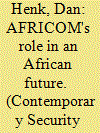

|
|
|
|
|
| Publication |
2009.
|
| Summary/Abstract |
In the recent past America's leaders created a major new military entity the US Africa Command (AFRICOM). In a well researched article,authors James Forest and Rebecca Crispin describe AFRICOM and the motivations for its creation, offeringn an interesting glimpse into the ways America's political leaders see the world and their role in it.
|
|
|
|
|
|
|
|
|
|
|
|
|
|
|
|
| 8 |
ID:
161493
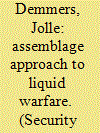

|
|
|
|
|
| Summary/Abstract |
The Western state-led turn to remote forms of military intervention as recently deployed in the Middle East and across Africa is often explained as resulting from risk aversion (avoidance of ground combat), materiality (‘the force of matter’) or the adoption of a networked operational logic by major military powers, mimicking the ‘hit-and-run’ tactics of their enemies. Although recognizing the mobilizing capacities of these phenomena, we argue that the new military interventionism is prompted by a more fundamental transformation, grounded in the spatial and temporal reconfiguration of war. We see a resort to ‘liquid warfare’ as a form of military interventionism that shuns direct control of territory and populations and its cumbersome order-building and order-maintaining responsibilities, focusing instead on ‘shaping’ the international security environment through remote technology, flexible operations and military-to-military partnerships. We draw upon assemblage as a heuristic device and the case of the US Africa Command (AFRICOM) to flesh out the complex and fluid nature of liquid warfare and the ways by which power operates across space. We outline how the forging of a transnational military assemblage in the name of ‘hunting Kony’ allowed for the buildup of an archipelago of military bases and operational capabilities across Africa, which serve as hubs for the monitoring, disrupting and containment of potential risks and dangers.
|
|
|
|
|
|
|
|
|
|
|
|
|
|
|
|
| 9 |
ID:
092695


|
|
|
| 10 |
ID:
119330
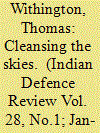

|
|
|
| 11 |
ID:
087312
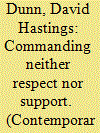

|
|
|
|
|
| Publication |
2009.
|
| Summary/Abstract |
One of the often repeated malapropisms of George W Bush was his claim that he was misunderestimated. A more accurate observation would be that the Bush administration was often misunderstood in its own approach to the outside world.
|
|
|
|
|
|
|
|
|
|
|
|
|
|
|
|
| 12 |
ID:
104602
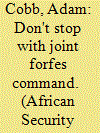

|
|
|
| 13 |
ID:
147689
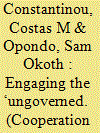

|
|
|
|
|
| Summary/Abstract |
This article explores biopolitical practices that extend beyond national borders and take the whole of humanity as their province. It looks at how attempts to secure and optimize conditions of living in Africa are not merely governmental in scope but also diplomatic in their conceptualization and conduct. It specifically examines the merging of diplomacy, defence and development (or the 3Ds), which purports to optimize life and shape ways of being in areas that cannot be ‘fully governed’ or resist domestication. It assesses the impact of diplomatic pluralization, characterized by the militarization of diplomacy and development, the diplomatization of the military, and new forms of diplomatic outreach, as practised by agencies such as AFRICOM. At stake in this exploration is an ethico-political critique of 3D engagement through which lives, conducts and relationships are negotiated in the postcolony.
|
|
|
|
|
|
|
|
|
|
|
|
|
|
|
|
| 14 |
ID:
087319


|
|
|
| 15 |
ID:
087310


|
|
|
|
|
| Publication |
2009.
|
| Summary/Abstract |
The starting point for understanding French reactions to AFRICOM's launch is to appreciate the very different historical significance that the continent has for France and the United States.
|
|
|
|
|
|
|
|
|
|
|
|
|
|
|
|
| 16 |
ID:
087329


|
|
|
|
|
| Publication |
2009.
|
| Summary/Abstract |
AFRICOM was created in an authoritarian manner without answering the fundamental question is AFRICOM in the American nationa interest. There are fundamental challenges that AFRICOM will struggle to manage, and it seems quite possible that it will have a not-so-promosing future.
|
|
|
|
|
|
|
|
|
|
|
|
|
|
|
|
| 17 |
ID:
099053


|
|
|
|
|
| Publication |
2010.
|
| Summary/Abstract |
The recent establishment of the US Africa Command (AFRICOM) embodies the resurgence of counterinsurgency arguments within the transformation of the US military. The command's emphasis on its "non-traditional" character that includes civil activities, a focus on the population's security, as well as its interagency approach intensified the controversy about the role of the military in US foreign policy. Rather than merely focusing on how to succeed in asymmetric warfare, AFRICOM proposes a long-term commitment of US forces in situations where violent conflict is not apparent and has to be prevented. This "proactive peacetime engagement" on the continent targets crucial communities and their perceptions through humanitarian and development projects. Africa is likely to become a testing ground for the US military's expansion into "non-traditional" activities ranging from counterinsurgency to conflict prevention. Blending security and development in this radical way may make the distinction between civil and military intervention vanish.
|
|
|
|
|
|
|
|
|
|
|
|
|
|
|
|
| 18 |
ID:
087316
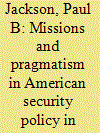

|
|
|
| 19 |
ID:
107819
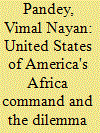

|
|
|
| 20 |
ID:
115623
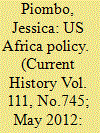

|
|
|